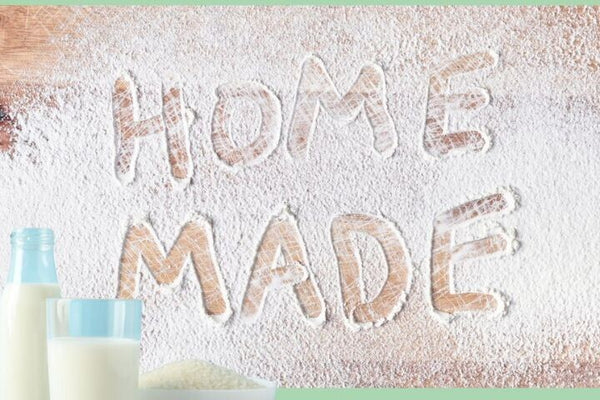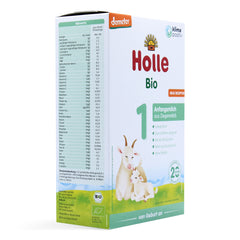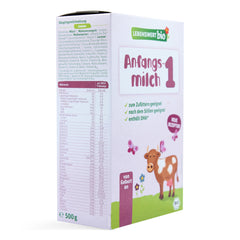Why Homemade Baby Formula is Riskier Than You May Think
48 hours of research 3 minute read

Embarking on the journey of parenthood entails making myriad decisions, with the most fundamental one being how to nourish your infant. Recently, the allure of crafting homemade baby formula has gained traction, especially in the face of formula shortages and the desire for complete control over a baby's diet. However, this seemingly empowering choice conceals a labyrinth of unexpected hazards, pushing us to unravel the complexities and explore safer alternatives for the optimal well-being of our little ones.
Understanding Homemade Infant Formula
Homemade infant formula, once a prevalent practice, has resurfaced in modern parenting circles. The idea of personally curating a baby's diet can be compelling, but it introduces significant safety concerns that demand a closer examination.
Homemade infant formula refers to a do-it-yourself alternative to commercially available formulas found in stores. While this practice was more common decades ago, it persists in some circles today. It involves using various ingredients, often sourced from the kitchen or local markets, to create a mixture intended to provide infants with a substitute for breast milk. This practice gains traction during formula shortages, but is it safe?
Is Homemade Baby Formula Safe?
The resounding answer is no. Despite the allure of having complete control over the ingredients and knowing exactly what goes into your child's diet, safety issues associated with homemade baby formula loom large. In the following sections, we'll delve into the potential risks and hazards that parents need to be aware of.
Contamination Issues: A Microbial Menace
Homemade formulas lack the rigorous regulations imposed on their commercial counterparts, leaving them susceptible to bacterial growth and contamination. A comprehensive study in 2020 analyzed 144 homemade formula recipes, revealing that nearly half contained ingredients with the potential to cause foodborne illnesses, posing severe health risks for infants.
Nutrient Imbalances: A Delicate Balance at Stake
Recipes for homemade infant formulas often fall short of providing essential nutrients, as highlighted by the American Academy of Pediatrics (AAP). Instances have emerged where infants fed homemade formula faced malnutrition, failure to thrive, and life-threatening complications like rickets and anemia, necessitating emergency medical attention.
Debunking Myths Surrounding Homemade Formula
To make informed decisions, it's crucial to dispel prevalent misconceptions about homemade formulas:
Natural and Organic Misconception: Unveiling the Complex Nutritional Balance
Contrary to the belief that homemade formulas are more natural and organic, commercial organic formulas undergo extensive research and testing to ensure a balanced and safe nutritional profile. Recognizing the intricate nutritional balance in commercial options is crucial for informed decision-making.
Ingredient Control Illusion: The Fallacy of Recognizable Ingredients
The belief that recognizable ingredients offer better control overlooks the scientific expertise required to balance nutrients properly in infant formulas. It also dismisses the stringent safety checks and quality control measures that manufactured baby formulas undergo.
Avoiding Additives and Preservatives: The Oversight of Safety Measures
Overlooking the regulated safety of additives and preservatives in commercial formulas neglects the risks of bacterial growth and contamination in homemade versions. Commercial formulas undergo meticulous testing to ensure the safety and quality of these additives.
Personalized Nutrition Fallacy: The Disregard for Established Guidelines
Assuming homemade formulas allow for personalized nutrition disregards extensively researched and scientifically established infant nutritional guidelines. Leading pediatric experts and regulatory bodies, such as the FDA, strongly advise against creating your infant formula due to the dangers associated with nutrient deficiencies and imbalances.
Safer Paths to Nourishment: Alternatives to Homemade Baby Formula
In navigating the intricate landscape of infant nutrition, prioritizing safety and health becomes paramount. Let's explore alternatives that align with established guidelines and scientific expertise:
Breastfeeding: A Time-Honored Best Choice
When possible, breastfeeding remains the optimal choice, as breast milk offers a unique blend of nutrients that adapt to a baby's changing needs. Both the American Academy of Pediatrics (AAP) and the World Health Organization (WHO) recommend exclusive breastfeeding for the first six months of life.
Donor Milk: A Safe and Beneficial Alternative in Unique Situations
In situations where a mother's milk isn't available, screened and pasteurized donor milk can provide a safe and beneficial alternative. Donor milk banks adhere to strict safety and quality standards to ensure that the milk is free from contaminants and safe for infant consumption.
Commercial Infant Formulas: Meticulously Formulated Options
For mothers who are unable or choose not to breastfeed, commercially available infant formulas based on goat milk, cow milk, or dairy alternatives are meticulously formulated to meet these needs. These formulas are supported by extensive research and testing to ensure they provide a safe and nutritionally balanced alternative.
The Gold Standard in Infant Nutrition: European Organic Formulas
When it comes to infant nutrition, European organic formulas have set a gold standard, renowned for their stringent standards and commitment to clean, safe, and nutritionally superior options.
HiPP Organic Infant Formulas: Nourishing with Nature's Best
Why HiPP? A German-based company, HiPP has been a pioneer in organic baby food for over a century. Their organic infant formulas are produced with strict adherence to EU organic regulations, ensuring the highest quality and safety standards.
Most Popular HiPP Formula
Holle: A Holistic Approach to Infant Nutrition
Holle is renowned for its commitment to biodynamic farming practices. Their organic infant formulas prioritize natural ingredients, free from synthetic pesticides and genetically modified organisms.
Most Popular Holle Formula
Lebenswert: Simplicity and Purity in Every Sip
Produced by Holle, Lebenswert stands out for its simplicity and purity. With a focus on minimal processing, Lebenswert's organic infant formulas prioritize essential nutrients without unnecessary additives.
Most Popular Lebenswert Formula
Kendamil: British Excellence in Organic Formulas
Why Kendamil? A British brand, Kendamil is recognized for its dedication to producing premium organic infant formulas. Using locally sourced ingredients, Kendamil follows stringent European standards, ensuring that their formulas are free from palm oil and other undesirable additives.
Most Popular Kendamil Formula
Exploring Specialized Formulas for Unique Needs
In cases where infants have specific dietary requirements or sensitivities, exploring specialized formulas becomes essential:
Hydrolyzed Protein Formulas: A Solution for Allergies
For infants with allergies or sensitivities, hydrolyzed protein formulas break down proteins into smaller, more digestible components, reducing the risk of allergic reactions.
Most Popular Hypoallergenic Baby Formula
Goat Milk Formulas: A Natural Alternative
Goat milk formulas, often well-tolerated by infants with cow milk sensitivities, provide a natural alternative with a nutrient profile resembling breast milk.
Best Goat Milk Formula
Prioritizing Safety, Health, and Tailored Nutrition
In the intricate landscape of infant nutrition, the emphasis should be on informed choices. Whether opting for established commercial formulas or exploring specialized options, parents can provide their infants with nutrition that aligns with established guidelines and guarantees optimal well-being.
Disclaimer: The information provided is for educational purposes only and should not be considered medical advice. Always consult with healthcare professionals for personalized guidance.
Top 4 Safe and Trusted European Baby Formulas
Organic Life Start is committed to providing accurate, reliable, and trustworthy information to parents and caregivers. We carefully choose credible sources and follow a meticulous fact-checking process to uphold the highest standards in infant nutrition and parenting advice. To learn more about our dedication to accuracy, please explore our editorial guidelines.
Link To Sources











Atlas -
I’d like to save as much as I can, but I don’t want to compromise my baby’s health. What would you recommend to parents on a budget?
Bruce -
My wife and I have been trying to practice homesteading and we tried to make our own baby formula. While I am sure that the milk is clean because we prepared it ourselves, we do not know if it has the right amount of vitamins and nutrients that a baby her age needs. Should I continue giving her this milk or do you think I should see a doctor?